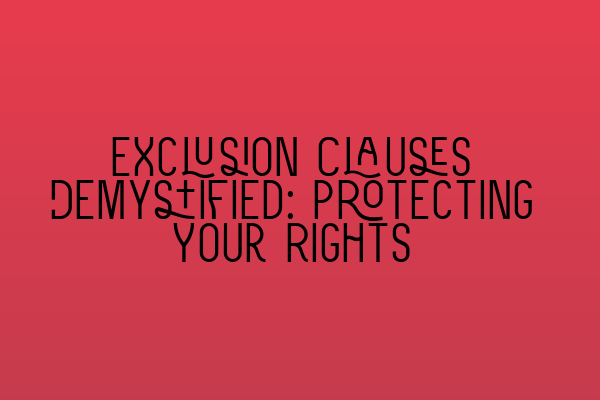Exclusion Clauses Demystified: Protecting Your Rights
Welcome to the SQE Contract Law blog! In today’s post, we will be demystifying exclusion clauses and discussing how they can protect your rights. Whether you are a solicitor, a business owner, or simply someone who wants to understand their legal rights, this post will provide you with valuable insights you can benefit from!
What are Exclusion Clauses?
Let’s start with the basics. Exclusion clauses are contractual terms that aim to limit or exclude liability for certain types of loss or damage. They are commonly included in contracts to protect one party from potential risks or claims that may arise from the performance of the contract.
Exclusion clauses are typically found in commercial contracts, such as those between businesses or suppliers and customers. However, they can also be included in consumer contracts, although there are legal limitations on their enforceability in such cases.
It’s important to note that exclusion clauses are subject to legal scrutiny and need to meet certain requirements to be enforceable. The courts will closely examine their wording, context, and overall fairness to ensure that they do not contradict any public policy considerations.
Types of Exclusion Clauses
Exclusion clauses can take various forms, but they generally fall into two categories:
- Limitation Clauses: These clauses limit the amount of liability that one party can be held responsible for. For example, a contract may include a limitation clause stating that any claims for damages cannot exceed a specific monetary amount.
- Exclusion Clauses: These clauses aim to exclude liability completely for certain types of losses or damages. For instance, a contract may include an exclusion clause that absolves one party from any responsibility for indirect or consequential losses.
It’s essential to be familiar with the specific terms and limitations outlined in an exclusion clause before entering into a contract. Many individuals and businesses often overlook this step, only to find themselves in difficult legal situations later on.
Enforceability of Exclusion Clauses
As mentioned earlier, exclusion clauses undergo careful scrutiny by the courts. This scrutiny is necessary to ensure fairness and to prevent parties from unjustly avoiding liability for their actions or negligence. Here are a few factors that can impact the enforceability of an exclusion clause:
- Reasonableness: An exclusion clause must be reasonable and fair to be enforceable. The courts will consider factors such as the bargaining power of the parties, the clarity of the clause, and whether the party seeking to rely on the clause has taken sufficient steps to bring it to the attention of the other party.
- Unfair Contract Terms: In certain circumstances, exclusion clauses may be considered unfair under consumer protection legislation. Such clauses may be deemed unenforceable, especially if they try to exclude liability for personal injury or death.
- Misrepresentation: If one party has made false statements or misrepresentations to induce the other party to agree to the contract, an exclusion clause may be invalidated.
To further understand the enforceability of exclusion clauses, it is advisable to consult with a qualified solicitor or legal professional who can provide tailored advice based on your specific situation.
Protecting Your Rights
Now that you have a better understanding of exclusion clauses, it’s crucial to know how to protect your rights when entering into contracts. Here are a few key steps you can take:
- Read and Understand the Contract: Carefully read and review all contract terms, including any exclusion clauses. Seek clarification or professional advice if needed to ensure you fully comprehend your rights and obligations.
- Negotiate: If you are uncomfortable with certain terms or find an exclusion clause to be too restrictive, try negotiating with the other party. They may be open to amendments that better balance the risks and liabilities for both parties.
- Seek Legal Advice: If you are uncertain about the fairness or enforceability of an exclusion clause, it is wise to consult with a solicitor who specializes in contract law. They can provide guidance and help protect your interests.
By taking these proactive steps, you can ensure that your rights are adequately protected when entering into contracts that include exclusion clauses.
Conclusion
Exclusion clauses can be complex, but with the right knowledge and guidance, you can navigate them effectively and protect your rights. Remember to read contracts carefully, understand the terms, and seek legal advice when necessary. By doing so, you can safeguard your interests and mitigate potential risks.
For more information and resources related to SQE Contract Law, check out these articles:
- SQE 1 Practice Exam Questions
- SQE 1 Practice Mocks FLK1 FLK2
- SQE 2 Preparation Courses
- SQE 1 Preparation Courses
- SRA SQE Exam Dates
Thank you for reading. Stay tuned for more informative and engaging content from SQE Contract Law!
